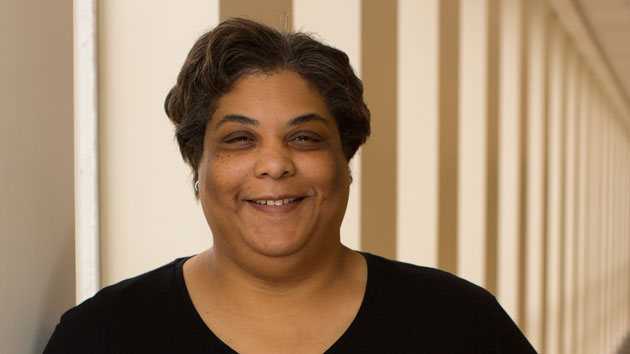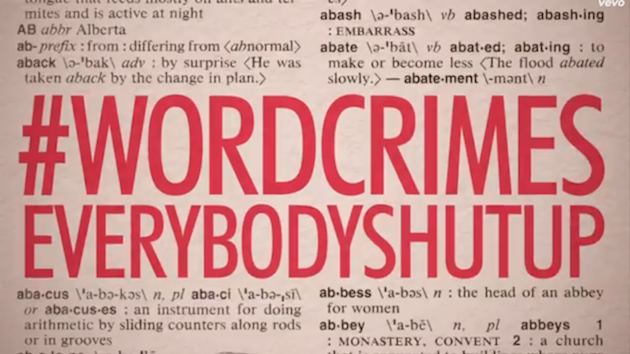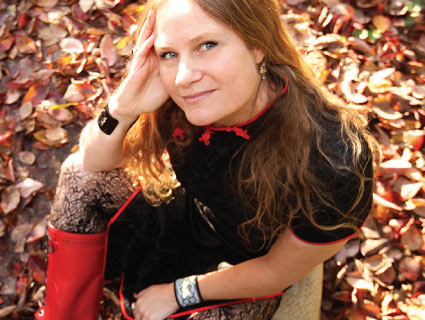
Jay Grabiec
In the age of “leaning in” and “having it all,” the superwoman model for female living persists with a vengeance. Feminism is supposed to be a refuge from all that perfection-seeking, but even there, it’s easy to feel bested, lured by things that are bad for women but great for entertainment: Cue your guilty dancing every time “Blurred Lines” comes on the radio.

In her new essay collection, Bad Feminist, out August 5, author Roxane Gay wrestles with this conundrum. “When I drive to work, I listen to thuggish rap at a very loud volume, even though the lyrics are degrading to women and offend me to my core,” she writes. “I am mortified by my music choices.”
Gay—literature professor, novelist, prolific Twitterer, and blogger who imparts life wisdom couched in cooking advice—is best known for her deeply personal essays about everything from politics to pop culture. Most of the writings in this collection have been published at various outlets, including at The Rumpus, where Gay is essays editor.
Bad Feminist reads like an autobiography, segueing from elements of Gay’s life—her Nebraska upbringing, her Haitian-American family, her cooking—into smart critiques of everything from reproductive rights to the Sweet Valley High and Twilight books. It’s a mix of the somber and the hilarious; Gay aptly quotes both Judith Butler and the Ying Yang Twins. “I am flawed and human,” Gay writes. “I am messy.” And capital-F feminism could do with a little more messiness.
I caught up with Gay a few weeks after the release of her latest novel, An Untamed State, as she prepped for back-to-back summer book tours, to discuss her survival tactics for social awkwardness, her Scrabble obsession, and why she never shows her writing to her parents.
Mother Jones: With two books coming out just three months apart, you must be going insane.
Roxane Gay: Yes, I am! It’s a good problem to have, but it’s a lot more time-consuming than I ever imagined. Never again.
MJ: Tell me about your novel, An Untamed State.
RG: It’s about Mireille Jameson. She’s a Haitian-American visiting her parents in Port Au Prince with her American husband and their infant son, and she’s kidnapped on their way to the beach and held hostage for 13 days. Her father is reluctant to pay the ransom. The longer she’s held, the angrier the kidnappers get. The novel looks at her life before, during, and after this kidnapping and how she’s affected by it. It’s a pretty dark novel, but I think that it ends on a note of hope.
MJ: How was it different to immerse yourself in a fictional work after being nonfiction-driven?
RG: It’s funny that you say that, because I tend to think of myself as a fiction writer first.
MJ: Oh!
RG: Everyone else thinks I’m a nonfiction writer. I think it’s because my nonfiction is easier to find. But I write both in equal measure. I love writing fiction because I can totally lose myself and I get to make up the rules of the world that I’m writing.
MJ: Given your Twitter presence, the new books coming out, and your full time academic job, I’m surprised you have any time at all to write.
RG: I just make the time. I tend to write three to four hours a day, depending—oftentimes very late at night. When I write on Twitter, I do other things: I’m working, grading, or reading, and I’m procrastinating, and I’ll pop on Twitter and be like, “Hey, what’s up? Yogurt’s delicious.'”
MJ: What was your big break as a writer?
RG: Oh God, I don’t know. I’m waiting for it? [Laughs.] I think my big break, if I’ve had one, would definitely be writing for the Rumpus, because that’s when I started to really develop a bigger audience. That’s how I found my first agent, who had read one of my essays there.
MJ: Okay, well, what’s the worst writing gig you’ve ever had?
RG: It wasn’t the worst because the money was pretty good, but the strangest writing gig I had was for this device—I can’t even remember the name of it. It was created by a chiropractor to help women relieve menstrual cramps. It was something like Ziivaa. It was crazy.
MJ: Wait, what?
RG: It was hilarious! It was a belt thing that you wear and it does what a chiropractor would do to relieve menstrual cramps, puts pressure on the hips and stuff.
MJ: Did they send you a tester?
RG: No! That was the weirdest part! They gave me lots of information and I got to interview one of the women who was funding it and all sorts of things. But I really wanted to try the product. I was like, “Well, let’s see if this thing works!”
MJ: What was it like as an immigrant kid growing up in Nebraska? I imagine you were one of the few kids who wasn’t kind of all-American.
RG: Definitely. We were the only black family in my neighborhood for many years. Wherever we lived, we were often the only black family, and certainly the only Haitian family. But my parents were really great at providing a loving home where we could feel safe and secure. There were definitely challenges, but it wasn’t as pronounced as you might imagine.
MJ: There’s a line in one of your essays about how you didn’t realize that your mom had an accent until the other kids in your class pointed it out.
RG: Yes, because that was just the way my parents talked. The first time kids started making fun of my parents’ accent and saying “How do you understand them?” I just thought, “What are you talking about?”
MJ: When did you decide that you wanted to be a writer?
RG: I’ve always wanted to be a writer. I’ve been writing since I was probably four years old—it was nonsense, but it was still my little attempts at being a storyteller. When I went to college I tried to major in pre-med and architecture and other serious things, but I really wanted to be a writer. I’ve had other kinds of jobs, but I’ve never stopped writing.
MJ: What other jobs?
RG: I worked for a student loan company at one point. I did a lot of telemarketing.
MJ: How does a shy, socially awkward person do telemarketing?
RG: Veeeery carefully. If you can’t see me, I’m very comfortable. That’s why I like to play online. Giving myself that barrier between myself and the world has always helped me. And then, about 15 years ago, I started working as a bartender so that I could learn how to talk to people. I’ve done a range of things to help overcome my awkwardness. I feel it still, but I’m much better about hiding it now.
MJ: How do you hide it?
RG: I play on my phone in public quite a lot. I pretend that I’m getting a very important message that I must attend to immediately. You will often see me in the middle of a huge crowd just staring intently at my phone because I just don’t even know how I should interact with other humans. With my writing, I generally just pretend that no one’s reading it. I allow myself that delusion so that I can write the things that I write.
MJ: So how do you deal with feedback, particularly the nasty commenters who troll women writing on the internet?
RG: I don’t read the comments anymore, unless they are moderated. Which is not to say censored, but I don’t need to read someone saying, “You’re ugly.” Nasty emails I delete. I read them, and of course it hurts. I’m human, and I allow myself to feel that hurt. But I also try to keep it in its proper place. This is not someone who deserves my time. They don’t deserve my pain. I try to remember that.
MJ: What draws you to writing?
RG: Writing has always allowed me to escape. I was a very lonely child. Because I was very socially awkward, I would always have trouble making friends. And so reading and writing allowed me to have friends and to have an active imaginary life that really sort of kept me sane. It’s still the same thing—I live in the middle of nowhere!
MJ: Do you still play competitive Scrabble?
RG: I do! I haven’t been able to play in a tournament for quite some time, but I play every day online.
MJ: What’s the best word you’ve played recently?
RG: Oh, God. “Gestate.”
MJ: Gestate?
RG: I was really happy with that. I played it in a perfect place and I was just like, “Yes!” I take it really seriously. I also love, love, love board games. Monopoly is my favorite—of course.
MJ: In the book, you write at length about race in entertainment and in politics. How about in feminism?
RG: For so long, feminism has neglected the needs of woman of color and people of color in general. But I don’t think it means that we [should] overlook feminism as having nothing valuable to contribute. The older I get, and the more I learn, the more I try to create a space within feminism for women of color, for working-class women, for queer women, for transgender women.
MJ: You cover some really depressing topics—reproductive rights, the death penalty, gun violence, and Trayvon Martin, to name a few. Don’t you get exhausted?

RG: Of course! But I’m writing about these issues. Imagine having to deal with them. Imagine having to be Trayvon Martin’s mother or his father. Or being Trayvon. Yeah, I’m exhausted, but I have the luxury of being exhausted.
MJ: You’ve also taken on some entertainment behemoths—Chris Brown, The Help, Fifty Shades of Gray—and you don’t always have nice things to say. Have you gotten a lot of pushback from your readers?
RG: I call myself out first! I’m right there with them consuming these cultural products. There are people who disagree, and they let me know. They definitely let me know. And that’s great. Most of the time I’m acknowledging that it’s complex; it’s hard to unilaterally dismiss everything. Like, you look at Chris Brown, and he’s just the worst. But then the more you learn about his life, how could he not have anger problems? He saw his mom being abused. I think empathy is important, and I feel that empathy even when I look at people like Chris Brown.
What killed me were these young women who were so into him that they were saying they were willing to be beaten by him. It breaks my heart. And we can look at something like Twilight, which is absolute dreck. The movies are terrible, but they are hilarious, and I find them to be endlessly entertaining. But the movies are also propagating some very pro-life, sex-after-marriage ideologies, aimed at people who are at their most vulnerable—young adults. We can’t just dismiss it. It’s a massive cultural phenomenon.
MJ: In Bad Feminist, you discuss how some women eschew the feminist label because of connotations it might carry. Did you ever do that?
RG: Definitely, because it sounded like a bad word, and whenever somebody referred to me as a feminist they weren’t paying me a compliment. But if you want to consider “feminist” a slur, that’s fine. I believe in equality, and if you don’t, that speaks far more to you than it does to me. I’ve gotten very comfortable with owning the label.
MJ: How did you arrive at this idea of being a “bad” feminist?
RG: So often feminism is built up as this thing where you have to be perfect. You have to be consistent and you can’t ever deviate. That’s just not realistic. Like, I love romantic comedies. I know how terrible they are, but I love them! And I don’t think that makes me less of a feminist.
MJ: Does your family read your writing?
RG: Oh, no. My brother and his wife sort of stalk me, but I don’t share my writing with my family.
MJ: Why not?
RG: Separation of church and state. My parents actually just found out about my first book in November. I needed to start preparing them for the fact that I have a book coming out that was gonna probably get a little bit more attention. So I took them to a festival where I was reading, and my dad looked at the book-fair table and he was like, “Oh that’s yours! That’s your name!”
MJ: What are you going to do after your double book tour?
RG: I’m working on a couple of things. I have a third book coming out in September.
MJ: A third book!
RG: [Laughs.] It’s an e-book! It’s just a small, fun project, a sarcastic annotation of Edith Wharton’s Age of Innocence. And then I have a book coming out in 2016 called Hunger. It’s going to be about weight and body and women. And I’m also working on some novels.















